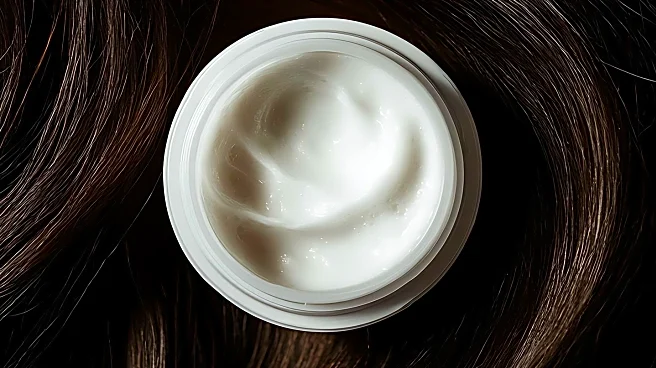What is the story about?
What's Happening?
Hair thinning during menopause is a common issue affecting more than half of women aged 50 to 65. This condition is primarily driven by hormonal changes, particularly the decrease in estrogen and progesterone levels, which affect hair follicle sensitivity and growth cycles. Dermatologists Hope Mitchell and Shino Bay Aguilera explain that these hormonal shifts can lead to hair becoming thinner, finer, or shedding more easily. They emphasize the importance of understanding the underlying causes to effectively address the issue. Nutrafol's Women's Balance supplement is recommended as a supportive measure, addressing hormonal shifts, stress, and nutritional gaps that contribute to hair thinning.
Why It's Important?
The issue of hair thinning during menopause is significant as it affects a large demographic of women, impacting their confidence and quality of life. Understanding the hormonal and nutritional factors involved allows for targeted interventions that can improve hair health. Products like Nutrafol's Women's Balance supplement offer a holistic approach by addressing multiple factors simultaneously. This development is crucial for the healthcare and wellness industries, as it highlights the need for specialized products catering to the unique needs of menopausal women. Dermatologists also play a key role in providing personalized treatment options, which can include advanced therapies like low-level lasers and platelet-rich plasma.
What's Next?
Women experiencing rapid hair thinning or significant changes in hair density are advised to consult dermatologists for tailored advice. Early evaluation can provide more treatment options, including advanced therapies like exosome treatments and polynucleotides. The focus is on combining medical support with holistic care to enhance hair vitality and health. As awareness grows, more women may seek professional guidance, potentially leading to increased demand for specialized dermatological services and products.
Beyond the Headlines
The cultural and psychological impact of hair thinning during menopause is profound, as hair is often linked to identity and self-esteem. Addressing this issue goes beyond physical appearance, touching on mental well-being and societal perceptions of aging. The development of effective treatments and supplements reflects a broader shift towards personalized healthcare, recognizing the diverse needs of aging populations. This trend may encourage further research and innovation in menopausal health, promoting a more inclusive approach to women's health issues.
















